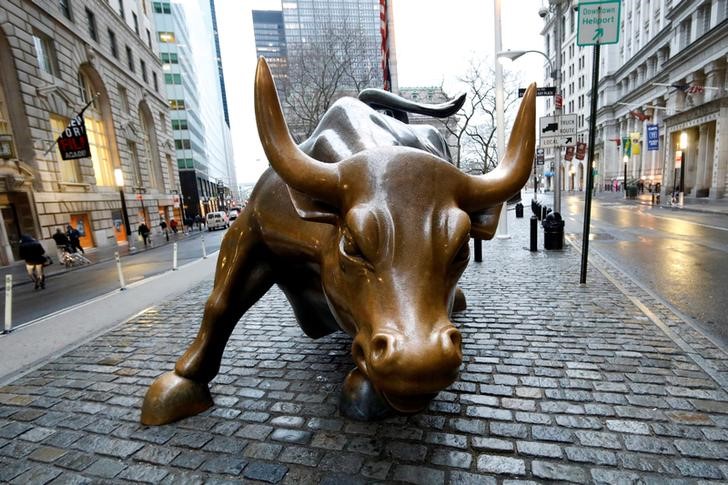Gold rally takes a breather amid Gaza ceasefire, Fed minutes
By Geoffrey Smith
Investing.com -- China’s President Xi Jinping lashes out against the U.S. in a high-profile speech. World carbon dioxide emissions are set for their biggest rise in 10 years this year. Tobacco stocks slump on fears of new U.S. regulation, and Netflix (NASDAQ:NFLX) reports its latest pandemic-fueled numbers after the close. Here’s what you need to know in financial markets on Tuesday, April 20th.
1. Xi lashes out at U.S. (without naming it)
Chinese President Xi Jinping lashed out at the U.S. in a widely-trailed keynote speech, again underlining the uninterrupted level of tension between the world’s two largest economies as they vie for supremacy in the post-pandemic world.
Although he didn’t mention it by name, Xi’s criticism of U.S. attempts to form a broader coalition to contain China’s growing economic and military clout was only thinly disguised.
“One or a few countries shouldn’t impose their rules on others, and the world shouldn’t be led on by the unilateralism of a few countries,” Xi told a high-profile business event. He also knocked attempts by other countries to reduce their reliance on supply chains originating in China, saying that ““any effort to build barriers and decouple works against economic and market principles, and would only harm others without benefiting oneself.”
The speech comes a day after another carefully orchestrated social media blitz against western corporate interests, this time in the shape of a protest against Tesla at a Chinese auto show.
2. Big Tobacco hurts
Tobacco stocks tumbled after The Wall Street Journal reported that the U.S. administration is planning new regulation to reduce the addictiveness of cigarettes by reducing the amount of nicotine in them. New Zealand recently moved to introduce similar regulation.
The WSJ said the decision is likely to be taken in conjunction with another one, due by April 29, on whether to ban menthol cigarettes.
Altria (NYSE:MO) stock was down another 1.8% in premarket after losing over 6% on Monday. In London, British American Tobacco (NYSE:BTI) stock and Imperial Brands (OTC:IMBBY) stock both fell over 5%. Pot stocks, meanwhile, benefited on perceptions that many smokers would switch to cannabis-related products.
Philip Morris (NYSE:PM), which owns the international rights to Marlboro, is one of many companies reporting before the open.
3. Stocks set to open lower on Covid, China fears
U.S. stocks are set to open lower later on fresh concerns that the spread of Covid-19 outside the U.S. will hamper the global recovery and weigh particularly on the guidance from U.S. companies that are active internationally.
By 6:30 AM ET (1030 GMT), Dow Jones futures were down 154 points, or 0.5%, while S&P 500 futures were also down 0.5% and Nasdaq 100 futures were down 0.4%.
Stocks likely to be in focus later include IBM (NYSE:IBM), which said its revenue grew for the first time in 11 quarters after the close on Monday, as well as Peloton (NASDAQ:PTON) and Tesla (NASDAQ:TSLA), which are both under pressure over unresolved safety issues.
The earlier reporters in earnings season are led by Johnson & Johnson (NYSE:JNJ), Procter & Gamble, Abbott Labs (NYSE:ABT), Lockheed Martin (NYSE:LMT) and Omnicom.
4. Netflix to keep riding the pandemic wave
The day’s biggest earnings release, however, arguably comes after the close as Netflix reveals its numbers for the first quarter.
The streaming giant is expected to have added 6 million new subscribers on a net basis, with the northern hemisphere winter and repeated pandemic-related lockdowns both providing tailwinds. Of more interest may be its guidance, given that both the seasonal and the pandemic factors are likely to tail off over the next six months.
Analysts expect earnings per share to nearly double to $2.97, while revenue is expected to have risen to $7.14 billion from $5.77 billion a year ago, thanks to price increases as well as membership gains.
5. Emissions rebound
World carbon dioxide emissions are set to rise sharply this year after plummeting in 2020 as the pandemic wrought havoc with world energy demand.
In its World Energy Outlook for 2021, the International Energy Agency said C02 emissions will rise 4.8% this year, their biggest in a decade, after slumping by 5.2% in 2020. That will still leave them below 2019 levels, however.
The rise is due in large part to the predominance of coal in the energy mix of emerging markets, which account for 70% of the expected 4.6% increase in global energy demand this year. Advanced economy energy consumption will also grow, but will remain 3% below 2019 levels, the IEA said.
Elsewhere on the energy radar later, the American Petroleum Institute reports its weekly assessment of U.S. crude and product inventories.
